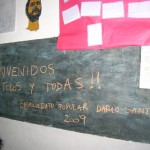
When Professors Strip for the Camera
If TED took a turn to leftist (or any) critique, Žižek, the professor of “toilets and ideology,” would be the keynote speaker. The irony of the animated lecture, “First as Tragedy, Then as Farce,” is that a diatribe on “global capitalism with a human face” would get over 900,000 views on YouTube. With YouTube’s help, the academy where Žižek’s persona was born is an increasingly visible terrain of so-called “cultural capitalism.” The last decade has witnessed a revolution in open courseware, a source of short-circuit consumption in which anyone with a computer can drink elite university Kool-Aid without earning credit. The movement has been so explosive – the Hewlett Foundation, which provides the mother lode of funding for university initiatives, supported a whole book on it, Taylor Walsh’s 2011 Unlocking the Gates – that one wonders how long the political economy of education that it anchors, contra Žižek’s hipster-friendly fantasies of consumerist dystopia, will last.
 Viewpoint Magazine
Viewpoint Magazine
